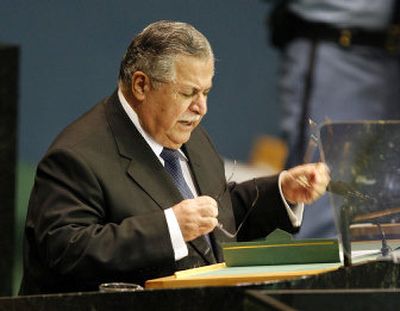Iraqi soldiers are no-shows

BAGHDAD, Iraq – Only a quarter of the Iraqi army forces that had been designated more than a month ago to work on security improvements in the capital have arrived, a sign of continuing problems with the government of Iraq’s ability to command and move its troops.
U.S. Army Maj. Gen. James Thurman, who is in charge of military forces in Baghdad, said Friday that he had requested 4,000 additional Iraqi troops to help secure Baghdad, but had only received 1,000 of those soldiers.
“Some of these battalions, when they were formed, were formed regionally,” Thurman said in a video news conference with Pentagon reporters from Baghdad. “And some of the soldiers, due to the distance, did not want to travel into Baghdad.”
Thurman’s comments came on a day of continued violence across Iraq, including the execution-style slayings of nine Sunni Arabs dragged out of a wedding dinner east of Baghdad by armed men said to be wearing Iraqi soldiers’ uniforms.
“Three civilian cars and one minibus came to our house with armed men wearing Iraqi army uniforms,” the groom’s father, Mohammed Duleimi, 61, told police. “They raided the house and asked to take some of the guests for routine investigations.”
Police later found nine wedding guests dead on Baghdad’s outskirts. Each had been shot several times.
On Friday, 27 bodies were discovered in Baghdad. At least 15 other people – including a U.S. soldier who was killed by a roadside bomb in the capital – were killed elsewhere in Iraq. Even as the killings continued, Iraq’s president, Jalal Talabani, addressed the U.N. General Assembly, saying that a continued U.S. troop presence in Iraq was “essential” while the nation builds its armed forces.
After establishment of the permanent Iraqi government in May, Prime Minister Nouri al-Maliki announced a new Baghdad security plan aimed at trying to get control of the sectarian violence that had destabilized the capital. But in July, U.S. officials announced that despite the stepped-up measures, violence had worsened.
In August, U.S. and Iraqi officials announced a new plan to secure the capital and said they would bring the 4,000 Iraqi soldiers and 4,000 additional Americans into Baghdad. The American forces were bolstered in a move that proved controversial for the Pentagon – extending the tour of the 172nd Stryker Brigade and moving the unit from Mosul to Baghdad. The extension drew complaints from relatives of members of the Alaska-based unit.
But Thurman made clear on Friday that bringing in the Iraqi soldiers had proved even more difficult. Soldiers from 1st Brigade of the 9th Division of the Iraqi army had been moved from Taji within 72 hours, Thurman said. But getting the remainder of the force had proved more challenging, with soldiers refusing orders to relocate to Baghdad.